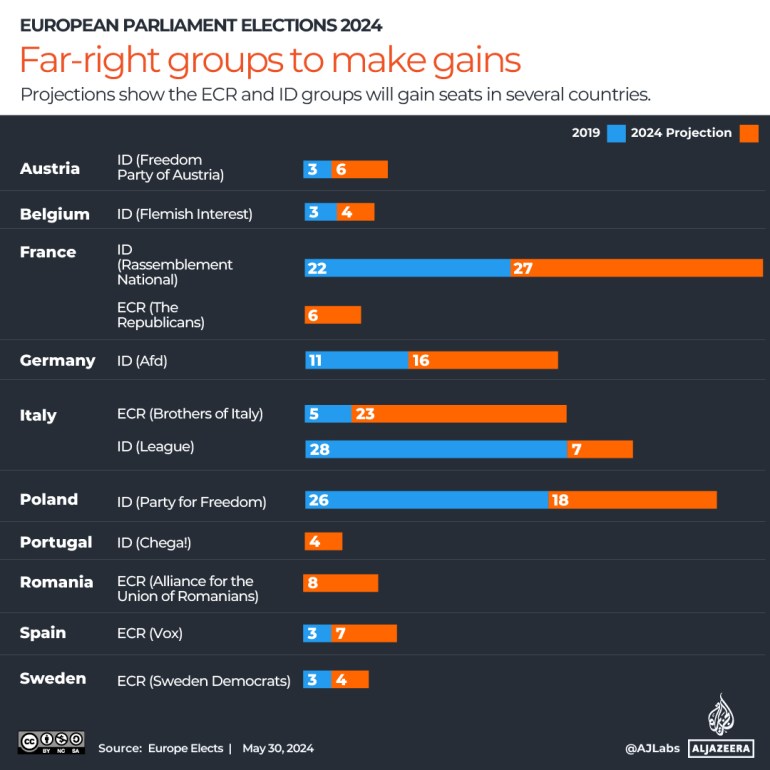Elections are set to take place across the European Union from June 6 to June 9, in a vote likely to have significant consequences for the 27-member bloc’s policies.
Almost 370 million Europeans will elect members of the European Parliament, the only directly elected institution of the EU which has the power to block legislation.
It’s the second largest democratic electorate in the world – after India, which just concluded its national election.
The vote, held every five years, is expected to strengthen far-right parties amid a rise in discontent for the mainstream centrist bloc, with implications for issues ranging from climate change and migration to foreign policy and social rights.
Here is what you should know about the EU vote and what is at stake.
How do European elections work?
Voters will express their preference for national political parties in a manner not dissimilar to a national vote. Once they are elected, most of the politicians then join European transnational political groups according to political orientation and ideology.
The two largest European parliamentary groups have historically been the centre-right European People’s Party (EPP) and the centre-left Progressive Alliance of Socialists and Democrats (S&D). The liberals, represented in the Renew Europe (RE) group, and The Greens have also been decisive in shaping majorities in the transnational body.
Right-wing populist parties are split between the European Conservatives and Reformists (ECR), and Identity and Democracy (ID), with the former being Atlanticist, favouring close ties with the United States; and the latter leaning towards Vladimir Putin’s Russia.
The vote kicks off at different times depending on the country. The Netherlands goes to the polls on June 6, followed by Ireland and the Czech Republic a day later. Italy, Latvia, Malta and Slovakia begin voting on June 8, while the rest of the EU member states vote on June 9. Results are expected to be announced later that evening.
Voters will be selecting 720 members of the European Parliament and seats are allocated according to each country’s population size, with Germany having the most (96 seats) followed by France (81), Italy (76) and Spain (61).
Who is projected to win?
Forecasts suggest that the main blocs in the political centre of the European Parliament – the EPP and S&D – will remain at the helm, likely granting Ursula von der Leyen another tenure as president of the European Commission.
But their “super grand coalition”, which includes liberal parties in the RE group, will likely lose seats due to public discontent in France with President Emmanuel Macron’s Renaissance party. Similarly, The Greens are also expected to take a hit after they made big gains in the previous election in 2019.
The big winners are expected to be the radical right. The ECR and ID, dominated respectively by Giorgia Meloni’s Brothers of Italy and Marine Le Pen’s Rassemblement National, or National Rally, in France, could bag more than one-fifth of seats for the first time.
Far-right groupings are also projected to be the largest political formations in at least five countries. The ID group is forecast to come first in Austria, Belgium, France and the Netherlands, while the ECR is leading in Italy.
Laszlo Andor, secretary-general of the Brussels-based think tank Foundation for European Progressive Studies (FEPS), said the centrist EPP group led by von der Leyen could slide further towards the right, deepening its collaboration with Eurosceptic parties such as Meloni’s Brothers of Italy and its ECR bloc.
“What we will see in the coming months is basically the test of the spine of the EPP, whether they remain committed to EU integration and address the challenges in a constructive fashion, or whether they engage in ‘politicking’ and use their nexus with some of the hard right and far-right parties,” Andor said.
What is at stake in this vote?
The rise of the radical right would have significant consequences for European-level policies, on issues including migration and the environment, say analysts.

Anti-migrant rhetoric has been used to inflame public opinion ahead of the vote. “There’s just one question on voting day,” Marion Marechal, of France’s Reconquete party, asked as she launched the EU electoral campaign. “Do you want an Islamised Europe or a European Europe?” Reconquete is projected to win six seats for the ECR group.
The ECR and the ID are likely to work together on hardline migration policies, including bolstering external frontiers, outsourcing responsibility to third countries to keep migrants out and focusing on returns.
They are also likely to oppose EU action to tackle climate change, including an ambitious package of reforms for a green transition known as the Green Deal.
At the heart of their opposition is the burden that climate action places on European businesses as they struggle to stay competitive. Across Europe, farmers’ groups, for instance, have blamed the EU’s trade deals for not being able to compete on the global market, despite economists blaming their scarce revenues on factors including disproportionate retailers’ profits.
“Unfortunately, voters are not going to get from these elections what they think they’re voting for by voting for the far-right parties,” Susi Dennison, senior policy fellow at the European Council on Foreign Relations (ECFR), told Al Jazeera.
“But that’s the kind of environment we’re working with where it’s the populist simple messages that are carrying the day when the reality is much more complex.”
Can a far-right EU supergroup be formed?
Yet, hard-right groups too remain divided on several issues and are unlikely to work together on those.
Ukraine is one major sticking point. While parties in the ECR including Meloni’s Brothers of Italy are largely in favour of military aid to Ukraine, other parties within the same bloc including Marechal’s Reconquete have set “red lines” for European engagement.
The far-right ID group, led by parties more comfortable with Putin, including Austria’s Freedom Party, Italy’s League and Belgium’s Flemish Interest, is broadly opposed to sanctions against Russia and aid to Ukraine.
The group has also had its own internal divisions. Germany’s Alternative for Germany party (AfD), a heavyweight within the ID group, was expelled from the group in May following declarations that oozed Nazi nostalgia.
Bulgaria’s far-right Revival party, which was also kicked out from ID, has called on Germany’s AfD to join it in a “truly conservative and sovereignist” group.
For now, the parties will be present in the European Parliament without being part of an official EU group.
“They could operate in a more king-maker role on deals and positions that might be taken,” Dennison, of the Berlin-based ECFR think tank, said. “In a way, they could have more power being outside the formal grouping than inside.”
Hungary’s far-right party Fidesz, led by Prime Minister Viktor Orban, has been unable to rally with either the ECR or the ID, opting instead to join the Non-Inscrits (NI) group gathering parties from both the right and the left that do not belong to one of the recognised political groups.
FEPS’ Andor, a Hungarian economist and former EU commissioner, said Nazi and fascist nostalgia had kept Fidesz from joining the ID group, while the Atlanticism of the ECR clashed with Orban’s sympathy towards Russia’s Putin. “This is a stumbling block for Orban to integrate into either of these groups,” Andor said.
Fidesz quit the EPP in 2021 after the group backed charges of backsliding on democracy and the rule of law levelled at the Hungarian government by EU institutions.
While unlikely to be bound in a broader coalition, far-right groups may still be able to expand their influence on European policies, rolling back some key elements of the progressive agenda.
“In Finland and Sweden they have been attacking workers’ rights, in Italy they are attacking women’s rights and everywhere they are questioning importance of the climate transition,” Andor told Al Jazeera.
“What is at stake in this election is the influence of the far-right political groups and whether pro-European groups can retain [a] majority or not,” he added. “Even if it does, the far-right is going to gain seats and this shift will result in complications if the EPP doesn’t draw a line.”
Read More: World News | Entertainment News | Celeb News
Aljazera








